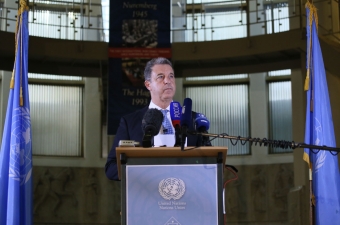Following the issuance of the trial judgment in the case Prosecutor vs. Ratko Mladić, Serge Brammertz, Chief Prosecutor of the International Criminal Tribunal for the former Yugoslavia, gave the following statement to the press:
Today, Ratko Mladić, the Commander of the Main Staff of the Bosnian Serb Army, was convicted and sentenced to life imprisonment for his crimes.
The Trial Chamber accepted our evidence that Mladić was a key participant in four joint criminal enterprises. He and other senior leaders intended to achieve their political and military aims by committing genocide, crimes against humanity and war crimes.
First, Mladić was convicted for commanding violent ethnic cleansing campaigns across Bosnia and Herzegovina from 1992 to 1995. The goal was to permanently remove Bosnian Croats and Muslims through widespread and systematic crimes. These ethnic cleansing campaigns included the murder of thousands of civilians. Tens of thousands of others were detained in inhumane facilities, where many were beaten, raped, murdered. More than one million Bosnians were internally displaced or forced to seek refuge abroad.
Second, Mladić was convicted for commanding a campaign of crimes during the Siege of Sarajevo. The goal was to spread terror among Sarajevo’s civilian population. Widespread sniping and massive artillery bombardments – ordered and overseen by Mladić – were part of daily life during the siege, leaving more than 10,000 dead, including so many innocent children. It left the city in ruins.
Third, Mladić was convicted for the genocide in Srebrenica in 1995. The goal was to eliminate the Bosnian Muslims of Srebrenica. Mladić used the forces under his command to execute several thousand men and boys. He further used these forces to forcibly expel 25,000 terrified women, children and elderly from their homes.
Finally, Mladić was convicted for using forces under his command to take UN peacekeepers as hostages. The goal was to deter NATO from launching airstrikes. Hundreds of peacekeepers were seized, detained, assaulted and used as human shields.
In regard to Count 1 of the Indictment, the Trial Chamber found that our Office proved that crimes were committed by the perpetrators with the intent to destroy part of the Bosnian Muslim group in a number of locations. This is an important conclusion. However, the Trial Chamber did not enter a conviction for genocide. My Office will review the Trial Chamber’s reasoning on this issue closely. I would like to emphasize that the Trial Chamber found that these crimes constitute crimes against humanity and war crimes, and that Mladić bears responsibility for these crimes.
Some today will claim that this judgment is a verdict against the Serbian people. My Office rejects that claim in the strongest terms. Mladić’s guilt is his, and his alone.
Others will say that Mladić is a hero and was defending his people. This judgment demonstrates that nothing could be further from the truth. Mladić will be remembered by history for the many communities and lives he destroyed.
The true heroes are the victims and survivors who never gave up on their quest for justice. They displayed real courage by coming to the Tribunal to tell the truth and confront the men who wronged them. On behalf of my Office, I would like to thank and recognize them.
My Office expresses its gratitude to the international community for supporting our work. We urge the United Nations and its Member States to continue supporting national prosecutors in the former Yugoslavia fighting for more justice for more victims. This work will not end with the closure of the Tribunal. Survivors from all communities are still waiting for justice. And too many families still do not know the fate of their loved ones.
Today’s judgment is a milestone in the Tribunal’s history, and international criminal justice. Ratko Mladić was one of the first persons indicted by my Office, and the last to be convicted. This judgment vindicates the Security Council’s vision twenty-four years ago: to secure peace through justice, by holding accountable the most senior leaders responsible for the crimes.
My Office would also like to thank you, representatives of the world’s media. You have an immense responsibility, to tell the public the truth of what happened. That is even more critical today, at a time when crimes are denied and war criminals glorified.
Finally, I would like to express my deepest gratitude to all those who have supported our work, including our staff past and present. I would like in particular to commend the Prosecution team in this case for their dedication and tireless effort.
The Presiding Judge concluded the judgment by reminding us that Mladić’s crimes rank among the most heinous known to humankind, including genocide and extermination. I couldn’t agree more.
Thank you for your attention.
Information for the Media
Ratko Mladić was born on 12 March 1942 in the municipality of Kalinovik in Bosnia and Herzegovina. He was trained at the military academy of the Yugoslav People’s Army (JNA) in Belgrade. In 1991, Mladić was appointed Commander of the 9th Corps of the JNA in Knin, Croatia. Subsequently, on 12 May 1992 he was appointed Commander of the Main Staff of the VRS. He remained in command of the VRS Main Staff throughout the conflict in Bosnia and Herzegovina.
On 24 July 1995, Mladić was indicted by the ICTY, together with Radovan Karadžić. After evading justice for 16 years, Mladić was finally arrested on 26 May 2011 in northern Serbia.
Mladić was charged with two counts of genocide, five counts of crimes against humanity and four counts of violations of the laws or customs of war, for a wide range of crimes.
Other members of the Bosnian Serb leadership have been convicted by the ICTY for the crimes committed during the conflict in Bosnia and Herzegovina, including Radovan Karadžić, Momčilo Krajisnik and Biljana Plavšić.


